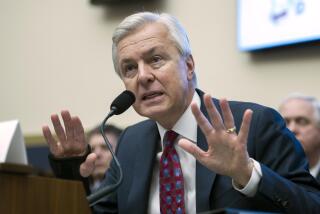Peregrine’s Pre-Filing Actions Questioned
- Share via
In the weeks before Peregrine Systems Inc. filed for Chapter 11 bankruptcy protection, the company’s executives focused their time and tens of millions of dollars on deals with banks and lawyers that were aimed at protecting themselves rather than fixing the San Diego software firm, according to a recent court filing.
The allegations, filed last week in U.S. Bankruptcy Court in Delaware week by a committee of unsecured creditors, provided a new look at the company’s inner workings.
Peregrine, whose chairman is San Diego Padres owner John J. Moores, is being investigated by the Securities and Exchange Commission and the Justice Department.
“While the company was facing all sorts of business challenges, it was doing things that may well give rise to civil liability and conceivably criminal,” said Bruce Bennett, chief counsel for the creditors committee.
Moores did not return calls for comment late Wednesday. But Richard Pachulski, an attorney representing Peregrine in its bankruptcy proceedings, said the allegations were without merit.
Peregrine is restating its finances from April 1999 through December 2001 and says revenue may have been inflated by as much as $250 million. Its former auditing firm, KPMG, has accused the company of possible fraud.
The creditors’ filing concerns Peregrine’s accounts-receivable practices. According to the filing, Peregrine sometimes sold the same receivables to two lenders and sometimes sold fictitious receivables.
The creditors also criticized Peregrine’s management for spending $2.9 million on an internal investigation of the accounting improprieties. The report, led by law firm Latham & Watkins and the accounting forensic team of PricewaterhouseCoopers, concluded that the directors were in the dark about the accounting improprieties.
Peregrine submitted the report to the SEC in late August.
Around the same time, the firm finalized retention bonuses and management incentives for many of its top employees and made plans to pay $5 million to a small group of key figures.
The bonuses include an undisclosed sum to Rod Dammeyer, the former head of the board’s audit committee, who resigned one day before auditor KPMG publicly stated that Peregrine’s finances were problematic.
More to Read
Inside the business of entertainment
The Wide Shot brings you news, analysis and insights on everything from streaming wars to production — and what it all means for the future.
You may occasionally receive promotional content from the Los Angeles Times.









